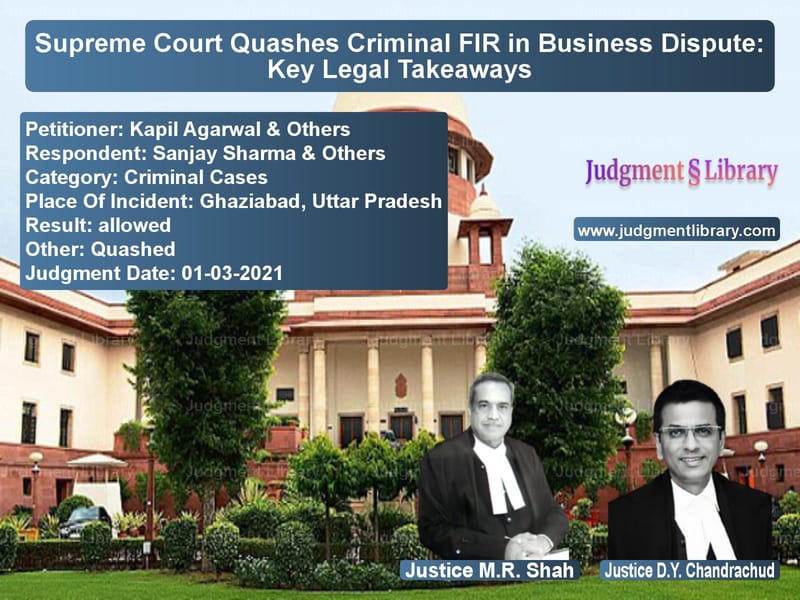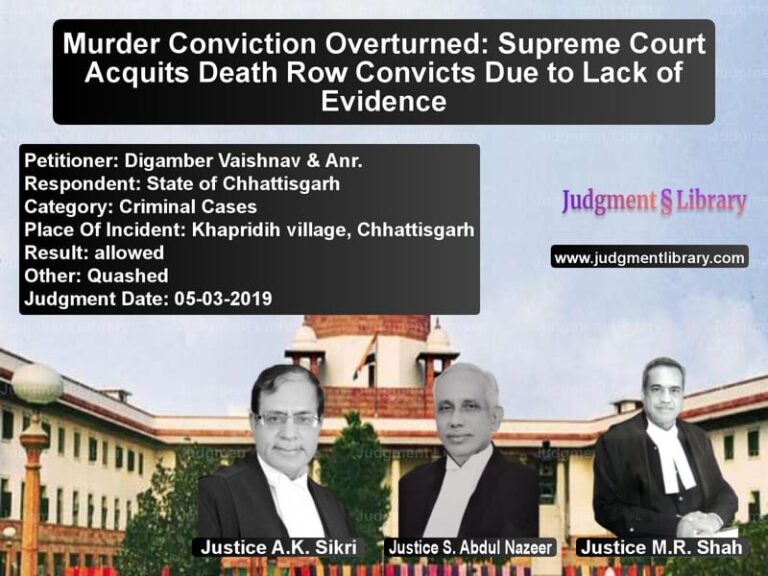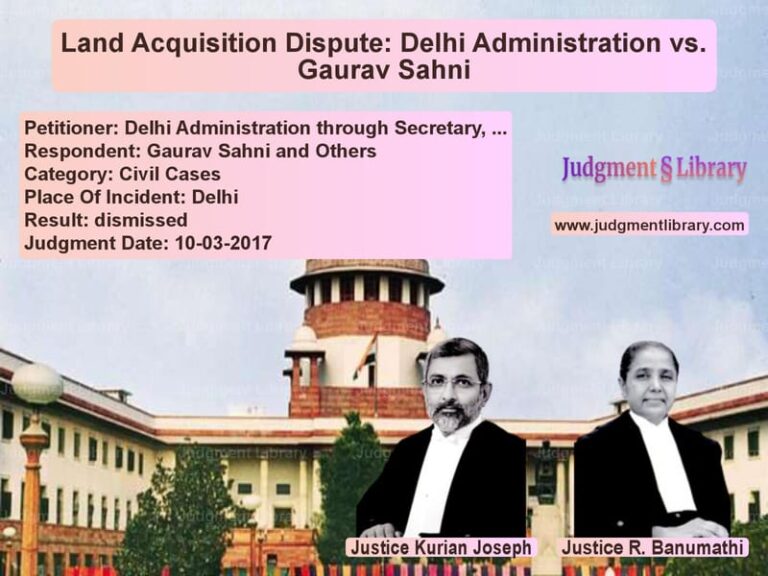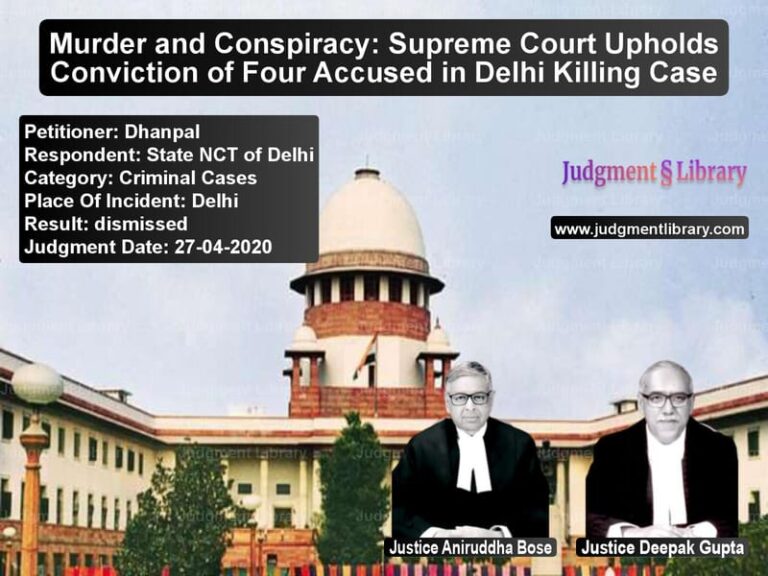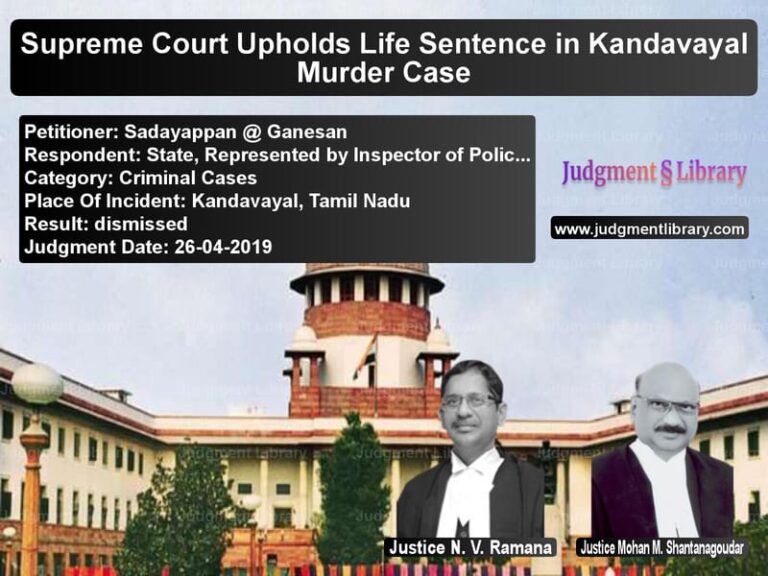Supreme Court Quashes Criminal FIR in Business Dispute: Key Legal Takeaways
The Supreme Court of India, in a landmark ruling, quashed an FIR registered under Sections 420 and 406 of the Indian Penal Code (IPC) against the directors and officers of Varun Beverages Ltd. The case, Kapil Agarwal & Others vs. Sanjay Sharma & Others, highlighted the misuse of criminal proceedings in commercial disputes and reinforced the principles of legal recourse under the Negotiable Instruments Act, 1881.
Background of the Case
The case originated from a business dispute between Varun Beverages Ltd. (VBL), a licensed franchisee of PepsiCo India Pvt. Ltd., and Sanjay Sharma, a distributor appointed in 2013 for the Loni area, Ghaziabad. In 2014, the company terminated the distributorship due to alleged non-payment of dues by Sharma. Following reconciliation of accounts, VBL determined an outstanding amount of Rs. 9,46,280 against Sharma, for which he issued a cheque dated September 15, 2014. The cheque was presented on September 22, 2014, but was dishonoured due to insufficient funds.
Subsequently, VBL filed a complaint under Section 138 of the Negotiable Instruments Act, 1881, against Sanjay Sharma, which was pending in the Chief Judicial Magistrate’s Court, Ghaziabad. In retaliation, Sharma filed an FIR against VBL’s officers for misappropriation of funds, but the investigating officer submitted a closure report stating that no case was made out. Undeterred, Sharma again filed an application under Section 156(3) CrPC for registration of an FIR against the directors and officers of VBL, alleging misappropriation of Rs. 31,12,375. This was treated as a complaint case under Section 200 CrPC by the Magistrate.
Despite these ongoing proceedings, Sharma lodged another FIR on August 4, 2017, under Sections 420 and 406 IPC, against VBL officers, which the High Court refused to quash. Aggrieved, the accused approached the Supreme Court.
Arguments by the Petitioners (Kapil Agarwal & Others)
- The FIR was an abuse of process of law and intended to harass the petitioners.
- The dispute was of a purely commercial nature, arising out of a business transaction, and should have been addressed through civil proceedings.
- The complainant had already initiated legal proceedings under Section 156(3) CrPC, which were pending before the Magistrate.
- Filing multiple criminal complaints on the same allegations was a malicious prosecution tactic to pressurize the accused.
- The company VBL was not made an accused in the FIR, yet its officers were targeted individually.
Arguments by the Respondents (Sanjay Sharma & Others)
- The FIR disclosed a cognizable offense of cheating and criminal breach of trust.
- Since the company owed the complainant commissions and discounts, the accused had fraudulently withheld his rightful dues.
- The complainant had no other remedy but to approach the police after failing to recover his money.
- The delay in filing the FIR was justified as the complainant was awaiting the outcome of earlier proceedings.
Supreme Court’s Observations
The Supreme Court critically examined the misuse of criminal law in business disputes and emphasized the following legal principles:
- Commercial Disputes vs. Criminal Cases: The Court reaffirmed that a breach of contract does not automatically amount to a criminal offense under Sections 420 and 406 IPC.
- Abuse of Process: Filing multiple complaints on the same facts, despite pending civil and criminal proceedings, amounts to an abuse of law.
- Pendency of a Section 156(3) CrPC Application: The Court held that an FIR on identical allegations was unnecessary when the complainant had already invoked his legal remedies before a Magistrate.
- Principle of Double Jeopardy: The accused cannot be subjected to multiple criminal proceedings based on the same allegations.
The Court stated:
“The subsequent FIR is nothing but an abuse of process of law and appears to have been filed solely to harass the accused. Criminal proceedings ought not to be permitted to degenerate into weapons of harassment.”
Supreme Court’s Verdict
- The Supreme Court quashed the FIR registered against the accused.
- It directed the Magistrate to proceed with the pending Section 156(3) CrPC application in accordance with the law.
- The Court cautioned against the misuse of criminal law in commercial disputes.
Impact of the Judgment
- Protection for Business Entities: The ruling prevents the misuse of criminal law in purely business disputes.
- Preventing Harassment through FIRs: The judgment discourages litigants from using the police system as a pressure tactic in financial matters.
- Strengthening Negotiable Instruments Act: The Court emphasized that Section 138 NI Act remains the appropriate recourse for cheque bounce cases, rather than criminal breach of trust or cheating allegations.
- Clarification on Parallel Proceedings: The ruling clarifies that a pending Section 156(3) CrPC application precludes filing an FIR on the same allegations.
Conclusion
The Supreme Court’s judgment in Kapil Agarwal & Others vs. Sanjay Sharma & Others establishes a crucial precedent in preventing the criminalization of commercial disputes. The ruling upholds the principle that civil disputes should not be converted into criminal cases to pressurize business rivals. By quashing the FIR, the Court has reinforced the need for a clear demarcation between commercial liabilities and criminal offenses, ensuring that criminal law is not misused as a tool for harassment.
Read also: https://judgmentlibrary.com/supreme-court-allows-recall-of-witnesses-in-tamil-nadu-corruption-case/
Petitioner Name: Kapil Agarwal & Others.Respondent Name: Sanjay Sharma & Others.Judgment By: Justice M.R. Shah, Justice D.Y. Chandrachud.Place Of Incident: Ghaziabad, Uttar Pradesh.Judgment Date: 01-03-2021.
Don’t miss out on the full details! Download the complete judgment in PDF format below and gain valuable insights instantly!
Download Judgment: kapil-agarwal-&-othe-vs-sanjay-sharma-&-othe-supreme-court-of-india-judgment-dated-01-03-2021.pdf
Directly Download Judgment: Directly download this Judgment
See all petitions in Fraud and Forgery
See all petitions in Bail and Anticipatory Bail
See all petitions in Extortion and Blackmail
See all petitions in Contract Disputes
See all petitions in Judgment by Mukeshkumar Rasikbhai Shah
See all petitions in Judgment by Dhananjaya Y Chandrachud
See all petitions in allowed
See all petitions in Quashed
See all petitions in supreme court of India judgments March 2021
See all petitions in 2021 judgments
See all posts in Criminal Cases Category
See all allowed petitions in Criminal Cases Category
See all Dismissed petitions in Criminal Cases Category
See all partially allowed petitions in Criminal Cases Category

